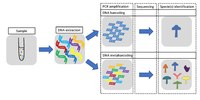
Photo from wikipedia
Abstract Apart from its contribution to climate change, offshore oil and gas extraction is also a potential threat to the diversity and function of marine ecosystems. Routine monitoring of the… Click to show full abstract
Abstract Apart from its contribution to climate change, offshore oil and gas extraction is also a potential threat to the diversity and function of marine ecosystems. Routine monitoring of the environmental status of affected areas is therefore critical for effective management. While current morphology-based monitoring is relatively time consuming, costly and prone to identification bias, environmental DNA metabarcoding offers an attractive alternative for assessing the impacts of oil drilling, extraction or spills. However, to be ready for routine monitoring, its performance needs to be demonstrated through agreement with assessments based on physicochemical measurements and current bioindicators. To this end, we applied metabarcoding to sequence the metazoan (COI) and total eukaryotic (18S) benthic components. We targeted a range of sites, with a gradient of low to high level of impact, located near active production installations and reference sites, in the North and Barents Seas. Alpha diversity and community structure of both datasets correlated strongly with a physicochemical pressure index (PI) based on total hydrocarbons (THC), PAH16, Ba and Cu. Calculations of the macroinvertebrate-based Norwegian Sensitivity Index (NSI) based on COI metabarcoding data agreed well with corresponding morpho-taxonomy values and with the PI. Further, we identified a set of bioindicator taxa from both metabarcoding datasets, to develop novel biotic indices and demonstrate their predictive performance using cross-validation. Finally, we compared co-occurrence networks from impacted vs. non-impacted sites, to improve the understanding of the ecological consequences of impacts. Our study demonstrates that metabarcoding can act as a meaningful and relatively accurate complement to the current morpho-taxonomic approach.
Journal Title: Ecological Indicators
Year Published: 2021
Link to full text (if available)
Share on Social Media: Sign Up to like & get
recommendations!